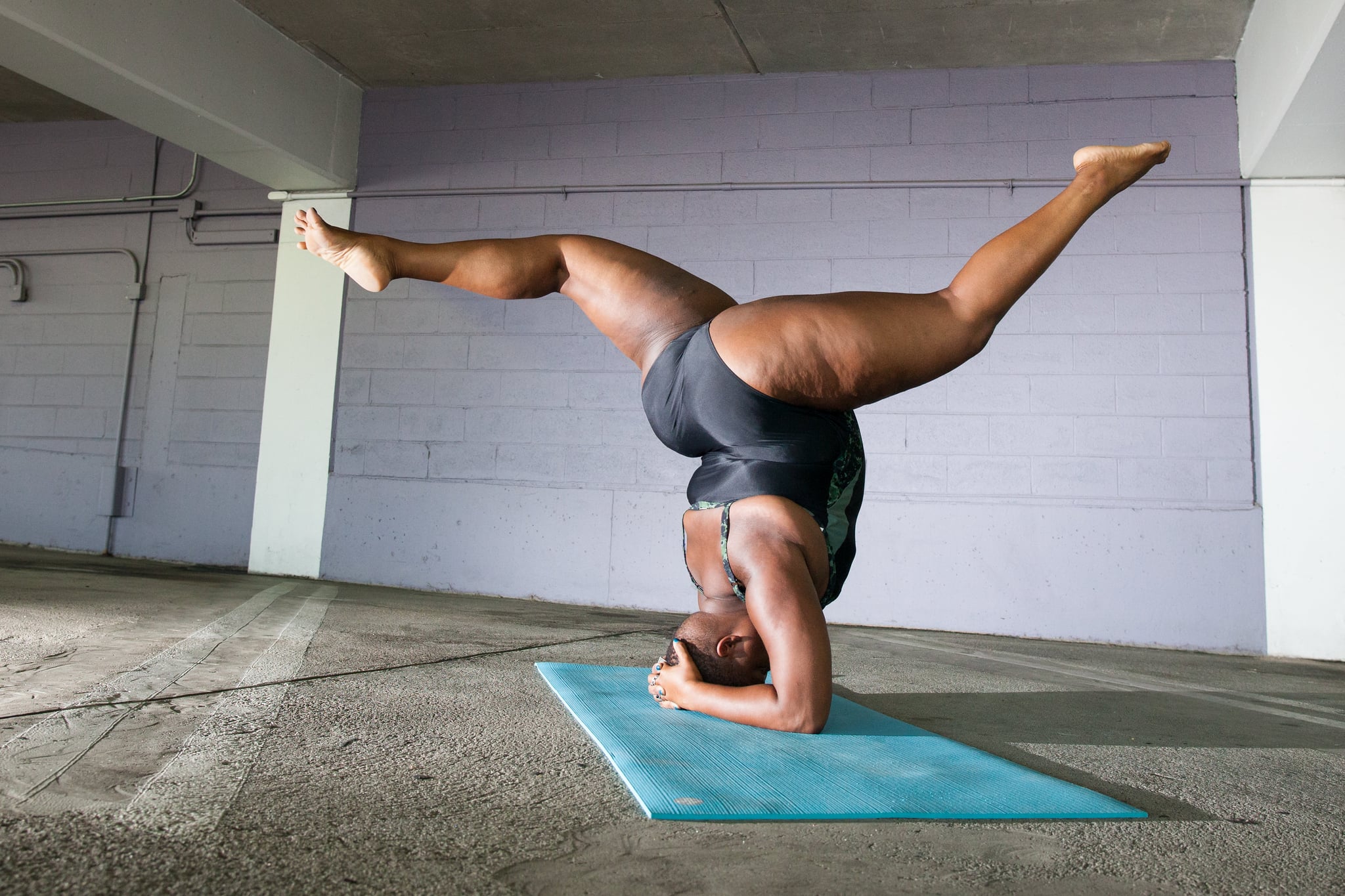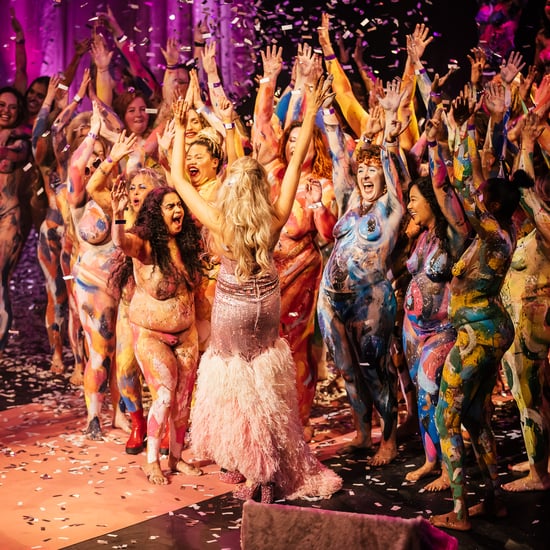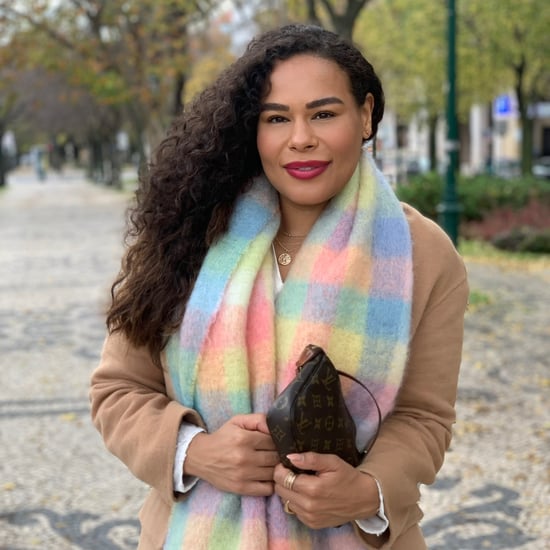Who Is Jessamyn Stanley?
Jessamyn Stanley on Yoga Practice, Body Positivity, and Not Being Afraid to Take Up Space
 Image Source: Zoe Litaker Photography
Image Source: Zoe Litaker Photography
When you think of yoga, the first image that probably comes to mind is a thin white woman saying "Namaste" while wearing a sporty tank top and printed leggings — maybe on a beach. And while there are plenty of those women doing Sun Salutations in a yoga studio near you, they are vastly over-represented in a world that is actually populated by people of many different shapes and sizes. But somehow 30-year-old Jessamyn Stanley doesn't let a lack of representation faze her — she's too busy being a badass yogi.
Stanley is unapologetic about taking up space in a world that is resistant to changing the appropriated narrative that makes women who look like her seem few and far between. Even though yoga remains her central focus, she has since turned her love for her practice into a highly visible social media presence that is actively disrupting the perceived norm — a space where she expresses her views on everything from mainstream acceptance of big bodies to musings about her continuous journey to find her space and place in the world.
Based in Durham, North Carolina, Stanley practices and teaches high-energy Vinyasa-flow yoga, an athletic style of yoga that strings various poses together to create a sequence. Her classes provide a body-positive approach that focuses on how the body feels vs. how it looks, a technique she developed through her own personal practice. If you looked at the photo above and thought she seemed vaguely familiar, here's why: she recently appeared in a U by Kotex commercial in which she spoke about practicing yoga while being on her period and as a larger person of color.
When she's not busy starring in nationally syndicated commercials, Stanley also runs a blog (where she has a kickass playlist, BTW), hosts a yoga and lifestyle podcast called Jessamyn Explains It All, and somehow finds time to listen to all of the Harry Potter books. I recently caught up with Stanley to chat about everything from her favorite yoga pose to why neither of us will sit on the 6 train in NYC.
 Image Source: Lydia Hudgens Photography
Image Source: Lydia Hudgens Photography
Tembe Denton-Hurst: Tell me about the first time you did yoga.
Jessamyn Stanley: The very first time I did yoga, I was 16. I was very much the youngest person in the room, and definitely the largest person. There were [also] very few people of color, but that really wasn't even what struck me so much as the fact that [yoga is] really, really hard. I found everything from the experience to be challenging. It was a Bikram yoga class — which is a style of hot yoga — and the heat was so overwhelming. I made it a third of the way through the class before I was like, "I'm good on this." They tell you not to leave, but I was like, "I don't care; I don't know y'all. I have to get out of here." I got really sick and was like, "I'm never doing this again. If that's yoga, then I'm good."
I ended up going back to yoga when I was in grad school, seven years later. I was going through a period of depression. One of my friends was like, "Oh my god, you should try Bikram yoga; it's so amazing." And I was like, "I'm not doing that. I already know it's not for me." She wore me down, and I realized that the experience of being manually pushed out of my comfort zone and being forced to see new aspects of myself was so cleansing. It's not like it magically got easier, [but] I understood the need for that kind of sensation.
TDH: How much has your practice changed since then? Are there aspects that haven't changed?
JS: My yoga practice has evolved and changed a lot over the years. When I first started practicing, I was definitely like, "I'm just going to do this yoga thing." I didn't understand it on this level, [but] I started practicing yoga at home. I learned a lot more about lineage, history, meditation, and breathwork — things that I had never even considered.
During that period, my practice became very athletic, and [I] focused on learning as many poses as possible. As time went on and I [began] teacher training, I realized why so much of the practice resonated with me: it is a way for me to look at aspects of myself that I've been hiding. I [want to] maintain this practice for the rest of my life. Regardless of what happens, I can always turn back to it. It's a journey to the self, through the self, [and] something I consistently reflect on so that I can be more compassionate not just toward myself, but toward other people — and I think that is a profoundly different place from where I began.
TDH: How do you balance being a teacher and inspiration to others while remaining a student of the practice?
JS: I think it's awesome that more people are practicing. Most people have no idea that yoga is not just for thin white women. Most people are genuinely surprised by that. I'm glad that there's a wider variety of people living this practice for themselves. Ultimately, I feel like in order for me to really be living this practice for myself, I can't really be that concerned about the effect [it has] on other people. Eventually, I think I'll walk away from public presence, but I do think there's clearly a reason why all of this is happening right now. In order to live in my truth, I have to be open to that; it's just this interesting balancing point of simultaneously understanding that there's so much more than this and that what's happening right now is critical.
"It's a journey to the self, through the self."
TDH: Who and what inspires you?
JS: People that are being really honest and authentic, even when they have to stand or walk alone. I find myself constantly coming into conflict with fear, and seeing that I don't stretch my wings or step outside of certain boxes because I'm afraid. The people and things that really inspire me are those who just live in their truth without any fear of repercussion. Also people who are able to love and express compassion indiscriminately, because that's something I definitely struggle with: seeing beyond my expectations for the world and being able to love wholeheartedly. I do think as difficult and as complicated as that is, it's the reason that we're here: to love indiscriminately.
TDH: How do you deal with people who underestimate you?
JS: At this point in my life, [I] expect that. Most people are afraid of things in their own lives, and when they see other people embodying spaces that they are too fearful to, their knee-jerk reaction is to be hateful or create shame. Misery loves company. That's something that I encounter constantly in my professional life, especially. People go out of their way to undermine or underestimate me, and if someone is trying to undermine you or trying to underestimate you, that's a sign that what you're doing is worthwhile; you're taking up space that someone else is afraid to.
As a fat-bodied yoga teacher working in a traditionally small-bodied, predominantly white industry, it's very common [for] people to belittle me. They're afraid that what I think, believe, and embody is contradicting their existence, and their response is to put up a wall. I don't have time to be worried about breaking down those walls; all I can do is keep doing what I'm doing.
Image Source: Lydia Hudgens Photography
TDH: Have you always had a great relationship with your body? If not, how did you come to accept it?
JS: I've generally had a pretty terrible relationship with my body; I think I've spent the vast majority of my life trying to make [it] look different than it looks naturally. I've definitely started to develop a better relationship with my body, [but] I think it's a very separate issue from the yoga. The main thing, for me, has been understanding the horrible things that I say and think about myself, and I notice it's the kind of work people don't really want to do. When they think about body positivity and self-care and self-love, it seems like it's going to be some f*cking Instagram quote or something you repeat over and over until, magically, one day you feel great about yourself. The thing that has worked for me is actually stopping when I hear myself saying something [negative] and trying to deconstruct where that's coming from — this happens a million times a day, and it's very unpleasant and embarrassing, but the results are so profound. Every single day I'm just trying to show up to do the work that I need to do to feel better today — and tomorrow's another day, and yesterday was a different day . . . but today is all that really matters.
"If someone is trying to undermine you or trying to underestimate you, that's a sign that what you're doing is worthwhile; you're taking up space that someone else is afraid to."
While I was practicing yoga, I started to notice the things I would say about myself when I would take photos of my yoga practice. In the moment of the picture being taken, I would [think], "I feel so strong. I feel so powerful. Yoga is amazing and great." Then I would look at the picture and immediately start talking sh*t about myself — "Oh my god, my stomach, my arms." We always want to blame the media and parents and friends and partners, but I'm the one who's saying these things. Whether or not I'm reflecting it from others is not the question. I am doing this. I can't control every aspect of my environment, but I can control what I'm going to think. Really understanding that put me on the road toward a better relationship with my body.
TDH: One of the best moments in your practice?
JS: When I was in my teacher training, I was doing a partner yoga exercise with someone who was much smaller than I am. She [was] very petite, blonde — very different from me. And I'm supposed to put my entire bodyweight on her. I was just compulsively apologizing the whole time, like, "Oh my god, I'm so sorry." Eventually she stopped me and said, "You know you don't have to apologize for everything, right?" And I was like, "I guess I'm just apologizing for existing." I had never consciously thought that before, and I was shook: How long have I been thinking that? Have I been thinking that my entire life? I spent so much time [blaming] my issues on my romantic relationships or on my family and trying to fix everything with drinking, smoking, eating, or shopping. It was so profound, so much bigger than anything I'd understood or experienced. I [thought], "I will come back to this practice forever if I continue to see something real like that." I don't need to have the answer, and I don't need to get it all figured out. But that experience of truth is more than anything I could imagine.
TDH: That speaks to me on such a real level. I'm constantly apologizing for myself. I even get anxious sitting on the benches on the subway. I'm always so stressed out.
JS: If I'm on the 6 in the city, I will not sit down on one of the benches unless I have a seat in between. People ask me why I still live in North Carolina, and if I had to live in New York, I would, but then there's that nonsense with the train.
 Image Source: Zoe Litaker Photography
Image Source: Zoe Litaker Photography
TDH: You've been so open on social media — how has that affected you?
JS: The reason I've maintained my [social media] presence is because I feel like there's an opportunity to change the narrative, to show what a yoga practice actually looks like. It's not just popping up into poses for pictures on social media. It's about really looking within yourself to see the conflict, to see the things that are unpleasant or offensive to other people. It's the truth of who you are.
PS: If you could go back to when you first started doing yoga, what would you tell 16-year-old Jessamyn?
JS: Don't sweat it — nothing that you're worrying about right now is that serious. Focus on just enjoying yourself and trying to be happy. That is your only goal.






